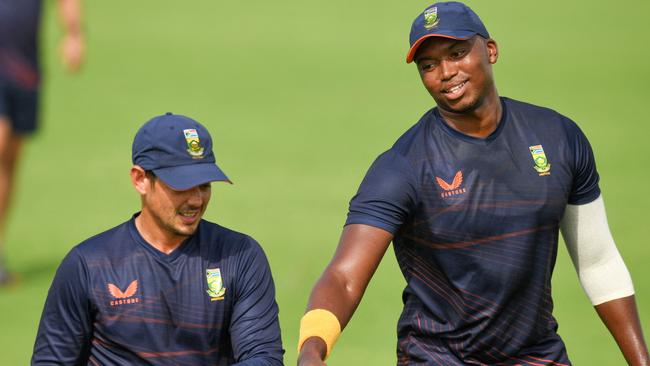De Kock’s refusal to take a knee a strange hill to die on
South African cricket is unique in its ability to tear itself apart as was witnessed by the de Kock debacle at this week’s World Cup.

When it is all said and done you really have to ask: what the actual Robin Goodfellow was that all about?
In case you missed it, Quinton de Kock refused to play for South Africa this week and in doing so disrupted his country’s World Cup campaign.
All of this not because he bought some extremist rejection of the anti-racism movement, not because he was afraid of death threats from white activists at home, not because he only took a knee before Jesus, not because he was silently and proudly racist, but because, as he eventually conceded, he did not like being told what to do.
It was not a matter, as one commentator asked, of how racist do you have to be so much as how indignant at a change of approach and a dictate?
In the end de Kock didn’t like being told what to do, or the way he was told what to do. Nothing more, nothing less.
He chose not to play a T20 World Cup match against the West Indies because of it.
There is valid sympathy for his position that gestures such as taking a knee should not be mandated. Teams as a matter of course, however, enforce rules on their members that would be considered an infringement on the rights of an individual. Curfews. Uniform codes. Standing at attention to national anthems. Compulsory extra curricula activities. Bonding. Hazing. Team songs. Team work.
As shallow as de Kock’s motivations were there are others who come out of this worse.
Shame on those who rushed to condemn him as racist. Not everything that looks like a duck is duck.
Shame too on the chaotic Cricket South African officials who have had years to establish an approach on this but changed their mind after one match of the tournament.
De Kock’s refusal to explain in the immediate aftermath encouraged the worst sort of conjecture, assumptions were made that his lack of action was a rejection of the position that black lives matter and that racism is an issue to be confronted and constantly countered.
Fresh from challenging the universe the weekend before, my colleague Gideon Haigh says in the current Cricket Et Cetera episode that if any good has come from the sorry incident it is that there has been further debate and engagement with the notion of taking a knee amid concerns that a gesture can quickly become hollow.
In essence, however, this was about the hamfisted way in which South African cricket goes about its business.
In his rambling but convincing statement, de Kock returns repeatedly to the way the issue was handled.
“Maybe some people don’t understand that we were just hit with this on Tuesday morning, on our way to the game … I felt like my rights were taken away when I was told what we had to do in the way that we were told”. After an emergency meeting with the board he has changed his stance but says “I wish this had happened sooner, because what happened on match day could have been avoided … We were previously told we had the choice to do what we felt we wanted to do … I won’t lie, I was shocked that we were told on the way to an important match that there was an instruction that we had to follow, with a perceived ‘or else’. I don’t think I was the only one.”
De Kock rejected the need to prove his virtue via signal. “I didn’t understand why I had to prove it with a gesture ... When you are told what to do, with no discussion, I felt like it takes away the meaning.”
De Kock, however, also did not understand what he was signalling by not taking the knee.
Nothing could be more South African than this spectacular implosion on a stage so large. The cricketer complained that “there always seems to be a drama when we go to World Cups. That isn’t fair.”
It is fairly apparent this is a reference to events in New Zealand on the eve of the 2015 World Cup semi-final against the home side. In his autobiography AB de Villiers, who was captain at the time, writes about a meeting at 5.30pm on match eve where the team was told the in form Kyle Abbott would be replaced by Vernon Philander who had recently been passed fit.
De Villiers was outraged “we had been assured the Cricket South Africa was the only national sporting governing body … that had declined to set a target for the number of coloured players … it depressed me even to think of my teammates in these outdated racial terms …”
As events in 2021 prove, it was presumptuous as it was inappropriate in 2015, for anyone in de Villiers or de Kock’s position to think race is an issue the world has moved on from.
Australian cricketers decided as a group that they would all take a knee before the World Cup games.



When that hill you choose to die on turns out to be more of a ditch. When that principled stance you chose to make turns out to be little more than adolescent petulance. When you let your teammates down and trigger the indignant mob.